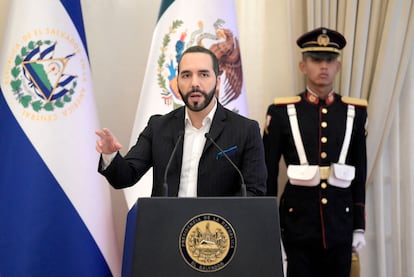Salvadoran President Nayib Bukele speaks during a press conference in San Salvador on May 6, 2022. MARVIN RECINOS (AFP)
The Salvadoran experiment to make bitcoin legal currency has hit a wall.
From the fall in global markets caused by the uncertainty of the war in Ukraine, inflation and the increase in interest rates by the Federal Reserve in the United States, the price of the most popular cryptocurrency in the world has plummeted more than 50% from its all-time highs.
With it, the bonds of the Government of El Salvador have also plummeted, which are trading at 40% of their original value, reflecting the doubts on the part of investors that the country can meet the next payment of its debt.
The rating agencies warned since last year that the volatility of the cryptocurrency would impact the already fragile public finances of the country, which is dollarized.
At the initiative of President Nayib Bukele, El Salvador became the first country in September to establish bitcoin as current legal currency, on par with the US dollar.
In October, Bukele announced that he had converted some $25 million of national reserves to Bitcoin.
“Bitcoin’s widespread adoption has been limited by its inherent price volatility, the low financial inclusion of the domestic banking sector, and the lack of widespread internet availability,” analysts at Fitch Ratings wrote in a November report. credit risk.
Despite its low adoption among the population, the decision had an immediate impact on the future of the Central American country.
The International Monetary Fund (IMF), which could provide support financing for the Bukele government to meet its next foreign debt payment in January, urged the country to eliminate bitcoin as legal currency, since it exposes public finances to ups and downs of the digital asset in the global market.
Bukele's insistence on keeping it complicated the negotiations with the Fund.
The ups and downs of the market, coupled with the weakening of institutions in El Salvador, cost the country its credit rating, which is largely used by the market to define debt default risk.
A low rating translates into higher interest that the government has to pay to creditors.
Also a rating considered “garbage”, as is the case of El Salvador, prevents the country from accessing global markets to issue more debt.
In February, Fitch cut El Salvador's rating to its lowest level and considered its future outlook "negative."
Moody's did so more recently, in May.
The downgrade reflects higher financial risks stemming from a greater reliance on short-term debt, an $800 million payment due in January 2023, a still-high fiscal deficit, uncertainty surrounding additional multilateral financing, and the increase in external financing costs, Fitch said in February.
The firm expects debt to reach 86.9% of gross domestic product (GDP) this year "raising concerns about debt sustainability in the medium term," analysts at the firm said.
“In Fitch's view, the weakening of institutions and the concentration of power in the presidency have increased policy unpredictability, and the adoption of bitcoin as legal tender has added uncertainty about the potential for an IMF program that would unlock funding for 2022-2023″, says the report.
For its part, Moody's warned in May that "even if the Government finds a way to manage the short-term financing pressures of the upcoming 2023 bond maturity, Moody's opinion is that the sovereign will continue to face financing pressures that would compromise its ability to meet its debt commitments in full.
On April 29, the Bukele Administration announced its intention to reform the pension system, without going into details of how much it expects to collect in taxes to strengthen public finances.
"Moody's believes it could release liquidity to meet the 2023 bond payment. However, as no details have been provided to date, sovereign credit risks remain elevated," analysts at the firm noted.
Subscribe here to the EL PAÍS América newsletter and receive all the key information on current affairs in the region.

